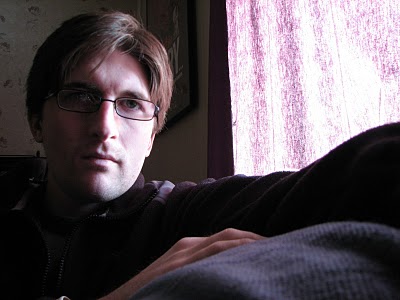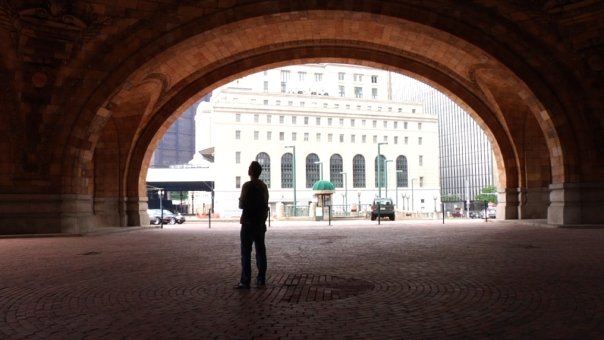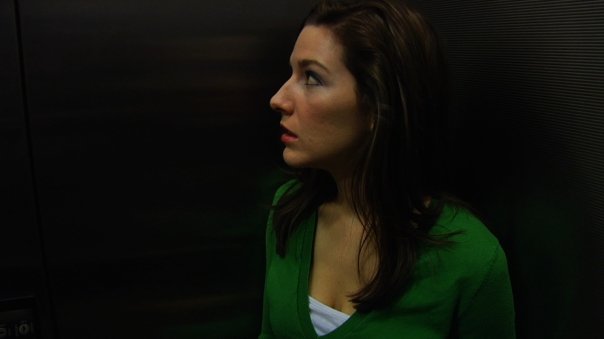Lucas McNelly Interview – Director of Blanc de Blanc
By Shane Rivers
Blanc de Blanc is the latest film from director Lucas McNelly. The idea for the project came about when a collection of filmmakers met online and began discussing the possibility of making a feature-length movie in just two weeks. Lucas took the challenge, and within 14 days he’d turned out a motion picture that would later appear at film festivals and draw critical praise. He was gracious enough to speak with Only Good Movies about the experience, as well as elaborating on the art of film and possible future projects.
Ladies and gentlemen, I proudly present Lucas McNelly.

Only Good Movies: According to the film’s Facebook page, the plot of Blanc de Blanc is as follows: “A man arrives, suddenly, in Pittsburgh and falls for a woman he meets on the street. Only, his past life isn’t willing to let him go without a fight.” Is there anything else you’d like to add to entice potential viewers?
Lucas McNelly: Blanc de Blanc is a mystery, stripped down to a character drama. What’s unique is that it’s a mystery that never bothers to reveal the mystery, allowing the audience to speculate and dig and look for the clues scattered throughout. Fewer than 1% of people who’ve seen it have figured it out. So it’s possible, but it ain’t easy. But even if you don’t figure out the mystery, there’s still a character drama.
OGM: The title translates to White from White. What’s the significance of that?
McNelly: Well, there’s a lot of white in the film, from the walls to Rachel Shaw’s clothes to her cat. Beyond that, the title makes a lot more sense after the final credits roll, but to say more than that would be to give away spoilers.
OGM: You credit filmmaker Reid Gershbein with being the one who first introduced the idea of making a full-length movie in two weeks. What was his reaction when you actually pulled it off?
McNelly: Well, Reid did one too (The Dabbler, the Dreamer, and the Man Who Sold the World), so I don’t know that he was exactly impressed. The #2wkfilm project was really a challenge among filmmakers, kind of a “I’ll do this if you do it” sort of dare. It was born out of the frustration so many filmmakers have in trying to get projects off the ground, only to have them continually fall apart. The idea being, if you force yourself to make a film on such a compressed timeframe, you’ll find a way to get it done where otherwise you’d just delay.
OGM: Much of the dialogue in the film was improvised. Was this a necessity given the short shooting schedule, or was it intended to play to the cast’s improvisational abilities?
McNelly: Since we didn’t have a script and we only had a short pre-production period, it was pretty obvious that we simply wouldn’t have time to write a script, so we focused our energy on creating a rather detailed outline and had the cast improvise based on that.
We also wrote quite a bit of backstory and Jason, in particular, was building his performance off that. Having the backstory was really important in making the mystery pay off for multiple viewings.
OGM: What was the biggest challenge and reward of filming a feature-length movie in only two weeks?
McNelly: The biggest challenge was the whole lack of sleep aspect to it. We shot it in 5ish days and spent the rest of the 2 weeks editing. I was also working full time at a day job. It was insane. But now I’ve got a feature film that I otherwise probably would have never made, and one I’m mostly happy with at that.
OGM: Many people who’ve watched your film come away asking “What’s in the box?”. For those who haven’t seen Blanc de Blanc, can you explain a little bit about the role of the box?
McNelly: Jason’s character arrives in town with nothing more than a backpack, and the most compelling thing in that backpack is a gold-colored tin box. Except he doesn’t have the key, and he isn’t sure what’s inside. Naturally, this is something audiences want to know, only I’m not telling.

OGM: If there had been more than two weeks to shoot the film, what’s the biggest change you would’ve made?
McNelly: The beauty of #2wkfilm is that if I wasn’t scrambling on such a tight schedule, I doubt I would have ever found this film. Beyond that, we probably would have written a proper script and fleshed out the story a little bit, maybe taken it from 80 minutes to 95 or so. I doubt I would have done something like film the backstory, as I really like how open-ended it is.
OGM: Was this your first movie to appear at film festivals? If so, was the experience what you expected it to be?
McNelly: My last film, Gravida, played at a bunch of festivals, including one where it was featured on MySpace Film for a week and screened on the Sony lot. We finished 2nd by one vote to a film starring Rainn Wilson and Jordan Belfi. I really didn’t know what to expect, so it was a great learning experience. For this one, we’re focusing on getting the film to audiences mostly through self-distribution, but hopefully we can supplement that with some more festival appearances. I’m sort of using the film as a test case in building an audience. The stakes are low, so I’m trying pretty much whatever comes to mind and seeing what works and what doesn’t.
OGM: Blanc de Blanc is your third film (including 2006’s L’attente and 2007’s Gravida). How do you feel you’ve improved as a director?
McNelly: There’s also Guard Duty (2004) and a bunch of other stuff that isn’t on IMDb. I’m a 100% self-taught filmmaker, so I feel I learn a lot every time out. For this one, the pacing was one of the biggest challenges. Beyond that, trying to figure out how and where to introduce various elements of the film ended up being a lot harder than I thought it was.
OGM: Which part of being a director do you have to work at the most?
McNelly: My focus is usually on story, so the biggest area I can improve is in visual flair. I can compose a nice, interesting shot, but I have trouble coming up with those sequences that just grab an audience and refuse to let go. There’s a ton of other stuff, but that’s probably the biggest.
OGM: When it comes to other directors, whose work do you find most inspirational?
McNelly: I’m a big fan of the French New Wave. Beyond that, I owe a huge debt to Bergman and Kieslowski.
OGM: Time for a hypothetical. You’re making a dramatic film with an unlimited budget, and you must cast the following: male lead, female lead, 2 supporting males, and 2 supporting females. In a perfect world, who would you cast?
McNelly: Like people currently working? Male lead: Edward Norton. Female lead: Kate Winslet. Supporting males: James Franco & Gael Garcia Bernal. Supporting females: Julie Delpy & Charlotte Gainsbourg.
OGM: Which films are your favorite when it comes to kicking back and watching for sheer enjoyment?
McNelly: Oh, probably something like a Wes Anderson film or some early Woody Allen. But, hey, like anyone else I’m prone to kick back and watch something shitty, like an 80’s movie with Willie Nelson in it or something.
OGM: Name the best and worst films you’ve seen in the last year (new release or on DVD).
McNelly: The best film I saw was a short, Peet Gelderblom’s Out of Sync. The worst? There’s so many. The Watchmen was pretty awful. Someone needs to tell Zach Synder that just because a shot is pretty, that doesn’t automatically make it a good idea.

OGM: Any advice for all the aspiring filmmakers out there?
McNelly: If you can find something else you enjoy doing that’s stable, do it. Being a filmmaker just isn’t worth it unless it’s something you have to do. Beyond that, if you want to become a filmmaker, just grab the cheapest camera you can find and make some shorts. Edit them on iMovie. Don’t spend any money. You’re just throwing it away until you’ve made 5 or 6 films. Most important: at first, shoot your own footage and edit your own footage. It’ll make you a better director.
OGM: Where the heck is Waldoboro, Maine, and what was it like growing up there?
McNelly: Waldoboro is in Midcoast Maine. It’s a small little town about 10 minutes from where they filmed In the Bedroom and The Man Without a Face. With the exception of Mel Gibson showing up once every 20 years, almost nothing ever happens there, and it’s a really nice place to raise kids. Lots of woods and such. Plus, it’s really easy to get lobster for cheap, which helps.
OGM: What’s next for Lucas McNelly?
McNelly: That’s what I’m trying to figure out right now. Obviously I’m working on getting this film out there. As for a next project, I’m trying to decide which of the 8-10 script ideas I’ve got floating around my head would be the easiest/best to do next. Of course, what’ll probably happen is I’ll come across something else entirely and do that.
I’d like to once again thank Lucas McNelly for taking the time to be interviewed. If you want to support independent films, head over to the Blanc de Blanc website and purchase a copy of the film on DVD. You can even buy a copy of the movie poster to hang somewhere in your home. Without indie films, we’d be left with nothing but crap like Transformers 2, so be sure and show your support.
